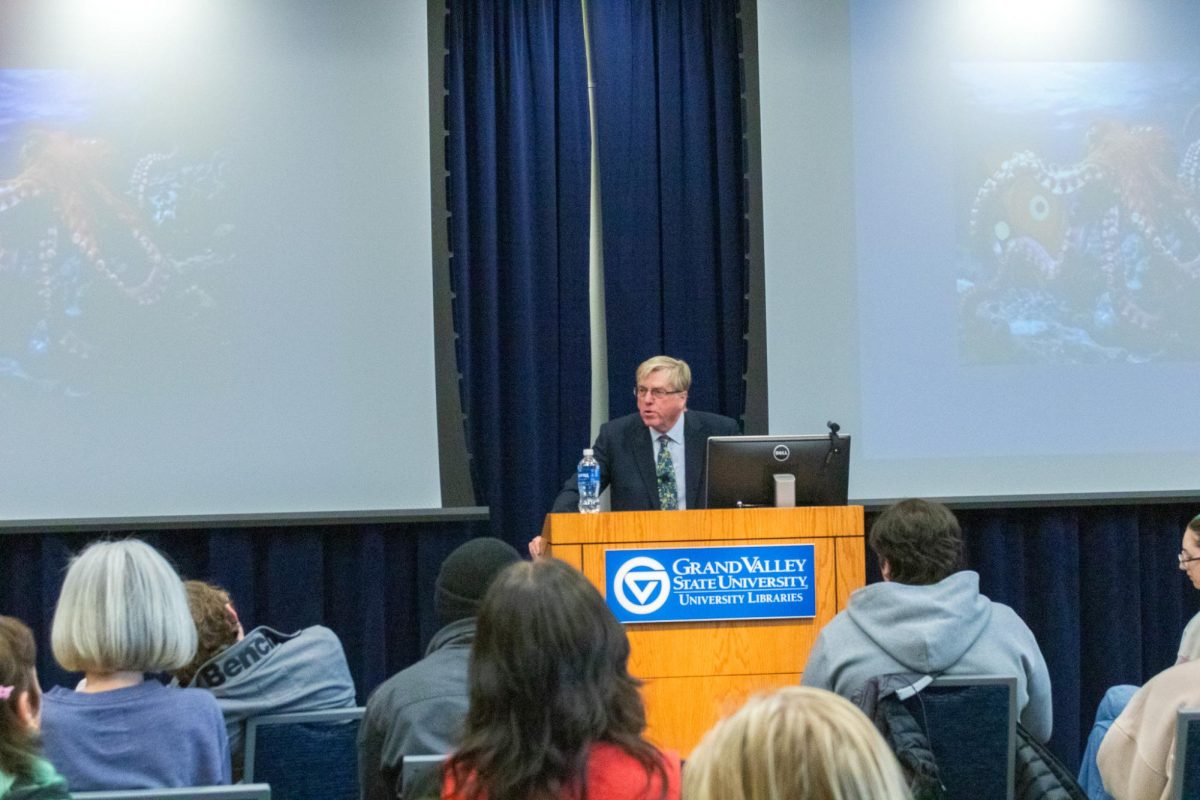Teacher Feature: Professor Vélez Ortiz

Professors Melba and Chad Vélez Ortiz. Photo courtesy Melba Vélez Ortiz.
Jul 15, 2019
For Grand Valley State University students who habitually check Rate My Professor before a semester starts, searching for “Professor Vélez Ortiz” might lead to some confusion — there are two results for the name. The first, Professor Melba, might find it difficult to compete with the startlingly perfect score of her colleague Professor Chad, despite being well-recommended herself. She has a theory for his success with students.
“Chad is a graduate from Guide Dogs for the Blind, which is the largest and most prestigious dog school in the U.S. and the UK,” Vélez Ortiz, his owner, said. “Basically, he’s from Harvard for guide dogs.”
“They didn’t tell me basically until graduation that Chad would have to come into the classroom with me,” Vélez Ortiz said. “I freaked out. I’m already competing with Instagram, you want me to bring a cute puppy into class?
“But Chad has been huge,” she said. “Students see me come in with him, and they immediately know what’s going on. They know it’s a team effort. They say hello to Chad before class — who is always loving — and they come in ready to learn. Chad calms them down, and everyone is looking out for one another.”
Professor Vélez Ortiz subverts what some might expect of her subject through her view that all communication classes are, in fact, ethics classes.
“Ethics is just an ugly word for rules of engagement, or, even more simply, promises,” Vélez Ortiz said. “The first thing I do in my classes is explain what I mean by ethics. My students usually think I’m going to spend all semester telling them not to steal pencils from work. But all kinds of criminal organizations have rules of engagement — it’s all contextual… Any instance in which an individual has to negotiate their own wellbeing versus a collective wellbeing… That’s ethics.”
Ethics and communications have an ancient and storied history together, as Vélez Ortiz’s research into the pan-African ideal of ma’at — and what is arguably the first formal ethical system in the world — shows its influence.
“Studying ethics, you read a lot of Greek texts — Plato, Aristotle, Herodotus — and they all have these footnotes about how they learned this and that from people they knew as Ethiopians,” Vélez Ortiz said. “I thought, ‘How come there are all these references, but no books on these ancient Africans when the Greeks are honest about just trying to adapt what the Ethiopians had done?’ So I said my first sabbatical I would take the time to figure out what the heck was going on here.”
Their guiding rule of justice and balance was immortalized by the Egyptians, who turned the concept into a teachable story that can still be seen in society today.
“In the afterlife, you enter a hall where there are twelve parts of the ‘divine’ and a woman holding a scale,” Vélez Ortiz said. “Today, when you think about a court, you have twelve jurors. You have a judge. If you think about how we represent justice today, she has scales, does she not? All of that is a direct reference to the concept of ma’at.”
Those interested in Professor Melba and Chad’s unique approach to Communications can take their general education sessions of COM 348, where ethics, rules of engagement and the ideal of ma’at are explored in greater detail.
“It’s better when you have engineers in there, nurses, mathematicians,” Vélez Ortiz said. “That’s what makes it good. Once you figure out what the right thing to do is, then you have to communicate it in a way that doesn’t alienate and isn’t rejected. Persuasion is paramount, especially when it’s over something you really care about.”






















